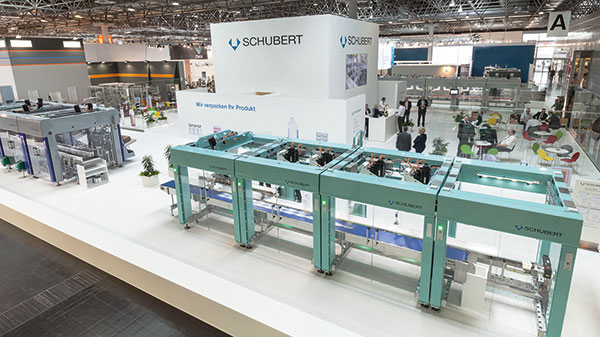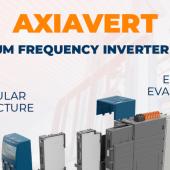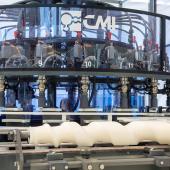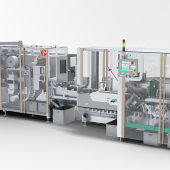End-of-line German style
Everything done in-house, a question of choice and sentiment. Schubert, continuing a family tradition, focuses on competency, production capacity and organisation.
In devising new projects, Gerhard Schubert GmbH follows the principle of combining intelligent software with essential mechanics, obviously aiming at improving the production efficiency and flexibility of systems dedicated to primary and secondary packaging. At Interpack we met up with Gerald Schubert (who with his brother Ralf, alongside father Gerhard, runs the archetypical - at least for the packaging machine world - German family company).
And his initial exclamation, as we arrived at their stand (“the market is incredible”) reveals the comforting optimism of an entrepreneur who, being able to rely on a solid and competent structure, is capable of coming up with the right answer at the right time.
Your main focus is on secondary packaging. How is this sector doing?
The market is truly incredible. I have been in sales for 25 years and I have experienced many ups and downs. Yet in this moment in time I am surprised by the peak in orders, by the liveliness of business and the number of projects underway, which we are able to keep up with thanks to our standardisation: this is both qualitative, a feature that has always inspired the development of Schubert’s machines but also project and organizationally based. In fact, our offer is fundamentally built on seven basic modules, today so flexible and intelligent to allow us maximum freedom of action. We can in fact achieve an infinite number of combinations, and this is the reason why users appreciate our packaging systems.
And our technology is interesting because, thanks to its flexibility, it is suited for pharma and food, but also for cosmetics, confectionary, technical products… that is all fast moving consumer goods.
To show you how important being flexible is for us, you should come and visit our works at Crailsheim: we are the sole packaging system constructor that assembles its machines like the automotive industry. Basic machine assembly time takes just three days, obviously without specific equipment and customised components. In this way we build around 2,000 robotised sub-systems a year.
And the lead time?
If we receive an order and the customer’s demands are clear, we can design and build a machine within 4 months, which is pretty good I think. In this moment in time we are processing a very high number of job orders, and the lead time is around 10 months. Which from our point of view is positive and comforting, but it is also a critical factor because as is known, customers want their machines in production as quickly as possible.
On the other hand, more than 90% of the software and hardware components we assemble on our machines are made “in-house” thanks to our embedded competencies in R&D, engineering and production.
What does owning the hardware and software, without having to purchase products from external suppliers, actually signify?
It means above all other things guaranteeing the customer. And, thanks to this approach, we have never found ourselves in the position of having to say to someone “we don’t have the spare parts”. At Crailsheim what is more, we have a large and well-organized storage facilities, with spare parts worth more than 8 million euros, which allows us to service machines even 20-25 years old.
Indeed, one thing matters before anything else: we were the first company in the world to produce robots for packaging machines, it took the market (and our competitors) 10-15 years to understand the value and the importance of our finding, that for us at the time this already spelled the future.
What are the advantages of being a family company?
We feel we have more strength, we are very flexible and people love working at Schubert and are proud of it, because they know they are part of an organization capable of offering the industry continuity (in 2016 Schubert will be celebrating its 50th anniversary Ed.). You only have to consider the fact we have never laid off personnel, even in the toughest of times economically and despite the difficulties.
On the market front, being a family company, and aboveall technologically leading-edge, means also offering guarantees to the large globalised companies and to the small firms with which we operate and that have got to know us: aiming at increasing the level of reciprocal faith is fundamental, because machines are bought and sold by people and only people can foster good personal relations this too on a business level.
You mentioned your inclination towards research…
Here too being the company owner counts. We invest between 8 and 10 millions in R&D each year and if I were “merely” the CEO of the company, I would probably be tempted to reduce that figure, to gain greater profits. At Schubert this obviously doesn’t happen.
Is the generational changeover going smoothly?
I would say it has already been completed: I entered the company in 1989, my brother Ralf a year after me, and we have both gradually taken on more responsibility alongside our father, who continues to experience and love the company as his own creation…He comes in every day, albeit the day to day business is actually run by me and my brother according to our own inclinations. In terms of my background and personal studies, I am more design and sales oriented, while Ralf is an IT expert and, as is known, finding the right balance between “mechanics” and “electronics” is fundamental…. even if things are evermore tilting towards the latter.
Basically we love what we do, we are aware of our strength and, above all, we know our business. Ralf in particular has a special capacity in responsibilizing people, encouraging them to play an integral part in the process of growth and development.
Ralf is leading the R&D but also the design and assembly departments. This is why the quality of the resources at Schubert is so high.
How are you structured?
We have a group of 10 companies, where around 1,000 people work, 700 of which employed in building machines at Crailsheim alone. Total sales in 2013 stood at around 280 million euros, exports comprising 80%, the European market absorbing a full 70% of our output. Overseas, the USA, Canada, New Zealand and Japan absorb 30 % of the sales. We have started to sell a few systems also to China and will develop this market slowly.
A clear declaration of optimism. Projects for the future?
We have devised a highly effective and innovatory secondary packaging technology, and we are looking towards the pharma market with evermore interest, where we have also been operating for many years now. We will continue on the road of innovation in order to lead the field of packaging technology also in the future. Our most recent proposal is a good example, a 3D scanner that enables us to even further enhance the performance of our TLM packaging systems, both in pick-and-place operations and in quality control. This gives the customer less production rejects, greater capacity and better control.
The primary packaging in form of thermoforming and filling technology will be a growth driven in the future.
Are you thinking of producing in other countries?
Some of our important customers are now producing in Brazil, India, China, both due to economic reasons as well as import duties (in the case of Brazil). But we have automated our production to the point that we don’t want to leave Germany.
And we are satisfied as to how the European market is going, that - despite the judgement of many - still shows good margins for growth.
 The TLM packaging machine prototype without control cabinet processes infusion bags as its product. The TLM packaging line for cartoning aerosol cans will be delivered to a customer after interpack. The line comprises just four sub-machines and features the automatic tool change. It currently processes aerosol cans of four different sizes and makes shelf-ready cartons in four different dimensions (cardboard tray plus lid). The output is 320 products per minute. |
 At Interapck 2014 Schubert displayed four TLM packaging lines. Thank to its flexibility, TLM technology is fundamentally suitable for packaging any product. At interapck these products were infusion bags, arerosol cans, chocolate bars and bottles. |

















